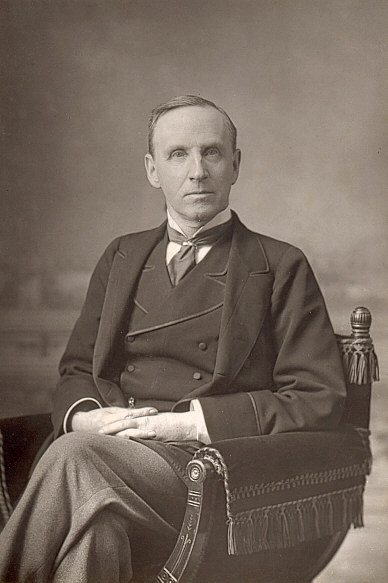John Morley frasi celebri
John Morley: Frasi in inglese
“The proper memory for a politician is one that knows what to remember and what to forget.”
Vol. II, bk. 4, ch. 2.
Recollections (1917)
Speech in Manchester (4 July 1895), quoted in 'Mr. Morley In Manchester', The Times (5 July 1895), p. 10.
“You cannot demonstrate an emotion or prove an aspiration.”
Rousseau http://www.gutenberg.org/files/14052/14052-h/14052-h.htm (1876)
Mr. Morley at Edinburgh: Aphorisms: an address delivered before the Edinburgh Philosophical Institution, November 11 1887, p. 3 https://babel.hathitrust.org/cgi/pt?id=hvd.32044079640421;view=1up;seq=11 (Macmillan, 1887)
“Evolution is not a force but a process; not a cause but a law.”
On Compromise http://www.gutenberg.org/files/11557/11557-h/11557-h.htm (1874).
Speech in Newcastle (21 May 1894), quoted in 'Mr. Morley At Newcastle', The Times (22 May 1894), p. 11.
“It is not enough to do good; one must do it the right way.”
Rousseau http://www.gutenberg.org/files/14052/14052-h/14052-h.htm (1876)
Speech at Huddersfield (21 May 1892), quoted in 'Mr. Morley At Huddersfield', The Times (23 May 1892), p. 7.
Speech http://hansard.millbanksystems.com/commons/1884/apr/03/second-reading-adjourned-debate-fifth in the House of Commons (3 April 1884).
“Those who would treat politics and morality apart will never understand the one or the other.”
Rousseau http://www.gutenberg.org/files/14052/14052-h/14052-h.htm (1876)
“You have not converted a man, because you have silenced him.”
On Compromise http://www.gutenberg.org/files/11557/11557-h/11557-h.htm (1874).
Speech https://api.parliament.uk/historic-hansard/lords/1921/dec/14/address-in-reply-to-his-majestys-most#column_7 in the House of Lords (14 December 1921).
Vol. I, bk. 2, ch. 8.
Recollections (1917)
Letter to Sir Francis Webster, president of the Montrose Burghs Liberal Association, quoted in 'Lord Morley On Modern Politics', The Times (11 May 1923), p. 12.
Annual presidential address to the Junior Liberal Association of Glasgow (10 February 1885), quoted in 'Mr. John Morley At Glasgow', The Times (11 February 1885), p. 10.
“Where it is a duty to worship the sun it is pretty sure to be a crime to examine the laws of heat.”
Voltaire http://books.google.com/books?id=bGFBAAAAYAAJ&q="Where+it+is+a+duty+to+worship+the+sun+it+is+pretty+sure+to+be+a+crime+to+examine+the+laws+of+heat"&pg=PA14#v=onepage (1871).
Speech at Rochdale town hall (23 April 1890), quoted in 'Mr. Morley At Rochdale', The Times (24 April 1890), p. 6.
Speech at Newcastle (2 December 1895), quoted in 'Mr. Morley At Newcastle', The Times (3 December 1895), p. 6.
Speech to the annual meeting of the National Liberal Federation (20 November 1890), quoted in 'Mr. Morley At Sheffield', The Times (21 November 1890), p. 10.
Speech opening the Passmore Edwards Settlement (12 February 1898), quoted in 'Mr. Morley On Social Settlements', The Times (14 February 1898), p. 12.
“Excess of severity is not the path to order. On the contrary, it is the path to the bomb.”
Vol. II, bk. 5, ch. 4.
Recollections (1917)
Speech to the Home Counties Division of the National Liberal Federation (13 February 1889), quoted in 'Mr. J. Morley At Portsmouth.', The Times (14 February 1889), p. 6.
Speech a Liberal demonstration in Sheffield (22 January 1889), quoted in 'Mr. Morley At Sheffield', The Times (23 January 1889), p. 10.
“In my creed, waste of public money is like the sin against the Holy Ghost.”
Vol. II, bk. 5, ch. 3.
Recollections (1917)
“I am, and always have been, a pretty strong individualist.”
Speech in the House of Lords (29 November 1909), quoted in The Times (30 November 1909), p. 6
1900s
Letter to Lord Minto (19 September 1907), quoted in D. A. Hamer, Lord Morley: Liberal Intellectual in Politics (1968), p. 56
1900s
Fortnightly Review (January 1877), p. 139
1870s
Speech in the House of Lords (3 November 1915), quoted in The Times (4 November 1915), p. 9
1910s
‘Politics and History’, Address as Chancellor of the University of Manchester (summer 1912), quoted in The Works of Lord Morley: Volume IV (1921), p. 33
1910s
